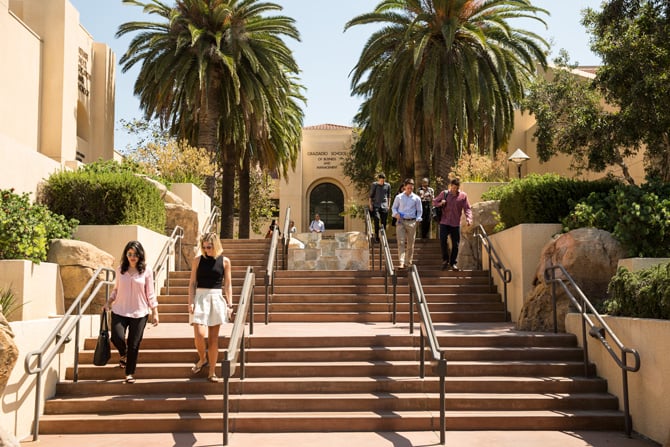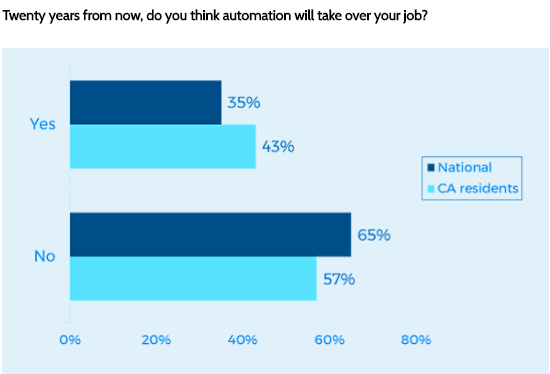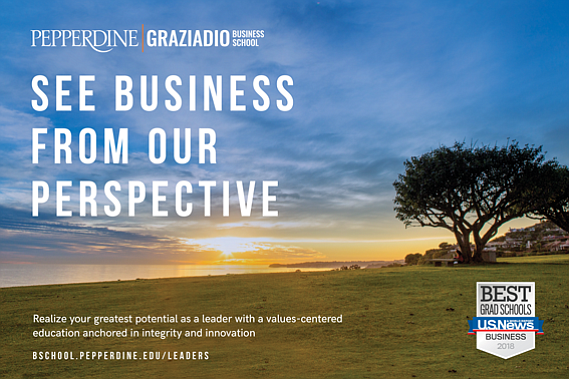Volumes have been written about millennial work styles and behaviors – and for good reason. By 2025, millennials will make up 75 percent of the global workforce. Often missing from the discussion are millennials’ perspectives on their own careers.
The Pepperdine Graziadio Business School explores these questions in a new research study, “Millennial vs. Machine: A Generational Study on Careers, Automation and Getting Ahead in an Era of Uncertainty.” The research examines the attitudes and behaviors of U.S. millennials, focusing additionally and specifically on millennials in California. Among the many findings, the research shows millennials have deep-seated concerns about their careers and the impact of economic and business trends. While upbeat about current jobs and salaries, findings suggest millennials are battle-worn from the prolonged recession.
MILLENNIALS TOP CAREER CONCERN, ECONOMIC UNCERTAINTY, YET THEY REMAIN UPBEAT ON THEIR CAREER POTENTIAL
A decade ago the job market essentially evaporated just as millennials were entering the labor pool. In the Pepperdine Graziadio poll, when asked what the greatest risk to their career is, the largest response was “economic downturn or recession”—cited by the majority of respondents. The next-greatest threats were “inability to keep skills current with the needs of employers” and “technology that exceeds your skillset or ability.” For their part, California millennials were slightly more likely to cite a recession as the top risk.
Which of the following do you believe is the greatest risk to your career?
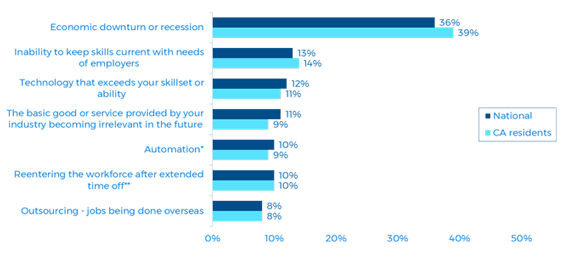
In spite of worries about economic uncertainty, U.S. millennials are actually quite upbeat about their potential careers. Indeed, a large percentage said they are confident they can meet those goals.
How confident are you that you can achieve your career goals?
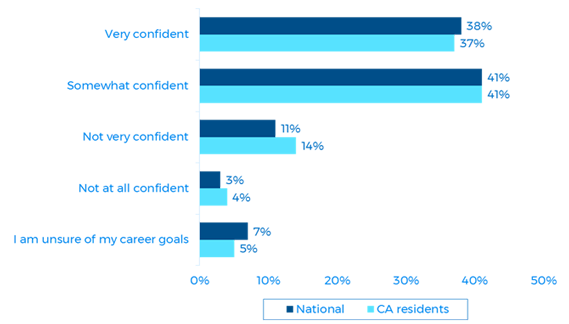
While much has been written about millennials’ high expectations for work and career, millennials themselves seem to think the job market is doing fairly well at meeting those expectations. Seventy eight percent said that they believe there are job openings that offer career growth for their age group, and 81 percent said that was true for jobs that offer a decent paycheck. What’s more, 70 percent believe that there are jobs out there that offer both; among California millennials, that figure was 75 percent.
AUTOMATION SHAPES MILLENNIAL PERSPECTIVES
More than one third of employed millennials believe that within 20 years, machines will be able to do the job they do today.
What’s more, “automation” is a not an abstract concept or distant possibility. Many younger workers are seeing it here and now. About 4 in 10 currently employed millennials either work in or have considered a job that manages automation.
Experience with automation clearly shapes millennials’ perspectives on the future. For example, those who work with automation are significantly more likely than others to believe that their roles will be automated in 20 years.
Meanwhile, slightly more California employed millennials are currently managing automation, compared to the national figure. But they are much more likely to foresee a significant impact from the technology, with 43 percent saying machines will take over their jobs in 20 years, versus 35 percent nationally. This higher percentage may stem partly from California’s prominent technology industry, and partly from the fact that automation has become a political issue at the state and local levels, with some calling for a “robot tax” to pay for the disruption to employment.
PATHWAY TO MILLENNIAL SUCCESS
Given the challenging environment facing millennial-age workers juxtaposed with their career confidence and desire for training and education, the benefits of earning an MBA or specialized degree are apparent. According to Graduate Management Admission Council there is a rise in specialized degrees that offer students the opportunity to quickly build their skills. Many schools are addressing this interest with new master’s degrees that compliment the foundational MBA degree. At the Pepperdine Graziadio Business School, students can deepen their knowledge and stimulate critical thinking through a variety of programs ranging from a traditional, fast-tracked and online MBA to specialized masters degrees in Applied Analytics, Applied Finance, Global Business, Human Resources, Management and Leadership, Organization Development, and Real Estate. All of these programs offer millennials the opportunity to advance their careers but perhaps most importantly discover how to use their knowledge and gained experiences to create an impact in business that is Best for the World.
